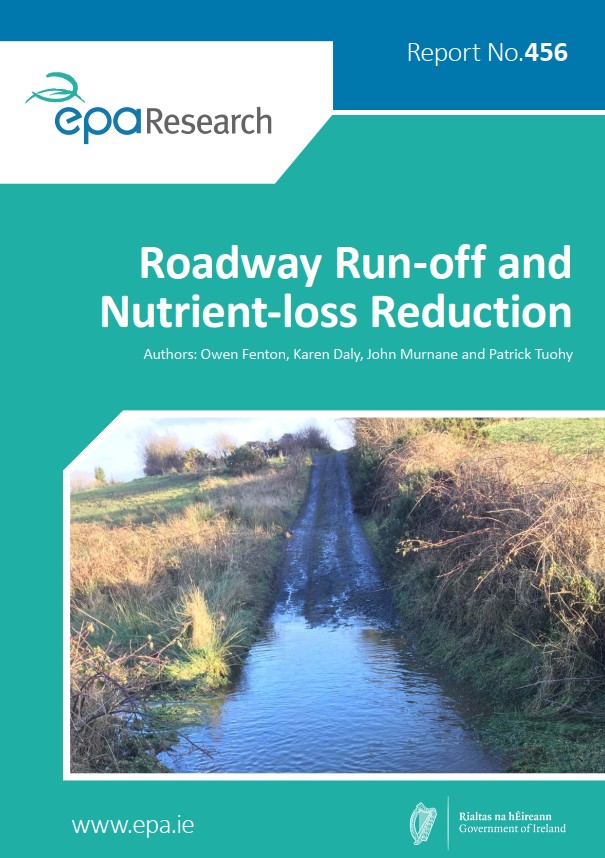
Authors: Owen Fenton, Karen Daly, John Murnane and Patrick Tuohy, May 2024
Year: 2024
The Nitrates Directive aims to protect water quality across Europe by preventing nutrients from agricultural sources, including livestock manures and other fertilisers, from polluting ground and surface waters, and by promoting good farming practices. Ireland’s Nitrates Action Programme states “There shall be no direct runoff of soiled water from farm roadways to waters”. Despite existing regulation, there has been minimal research in Ireland pertaining to the source, content, pathway, mobilisation and impact of roadway runoff. The Roadrunner project reviewed mitigation measures to treat roadway runoff, developed an on-farm visual tool to find and document connectivity between roadway runoff and waters, and provided the evidence base to define roadway runoff as a unique sub-component of the nutrient transfer continuum.
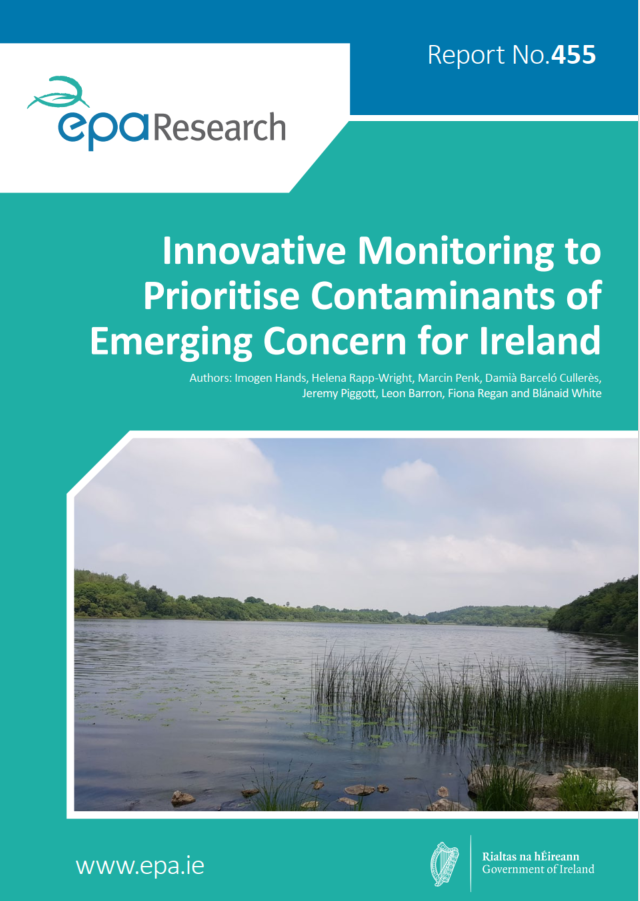
Imogen Hands, Helena Rapp-Wright, Marcin Penk, Damià Barceló Cullerès, Jeremy Piggott, Leon Barron, Fiona Regan and Blánaid White, April 2024
Year: 2024
Contaminants of Emerging Concern (CECs) can be defined as “any synthetic or naturally occurring chemical or any microorganism that is not commonly monitored in the environment but has the potential to enter the environment and cause known or suspected adverse ecological and/or human health effects”. This research provides a comprehensive insight into the occurrence and fate of CECs in wastewater treatment effluent on entry to Irish receiving waters. Two wastewater treatment plants (WWTPs), one urban and one rural were monitored for one year to identify the temporal and spatial occurrence of more than 100 CECs in the aquatic environment and the WWTPs influents and effluents. This work allows contaminants that are not efficiently removed during treatment of municipal effluents to be highlighted and enables an evidence-based prioritisation list of CECs to be developed in Ireland.

Authors: Ricardo Bermejo, Nessa Golden, Sara Haro, Sita Karki, Michéal MacMonagail,Sara García-Poza, Teresa Navarrete-Fernández, Benedikt Brunner, Kay Knöller,Mark Healy, Owen Fenton, Per-Erik Mellander and Liam Morrison., January 2024
Year: 2024
Eutrophication of waters and consequent algal blooms place significant pressure on marine ecosystems. Reducing the nutrient load of these waters is essential for ecosystem restoration. The MACRO-MAN project developed innovative methods to assess the environmental quality of Irish estuaries, and to identify drivers of and management strategies for macroalgal blooms. The potential risks associated with macroalgal blooms were considered in a global change context (e.g., climate change, emerging contaminants, biological invasions) in order to investigate the impact on ecosystem functioning and services provided by Irish estuaries. Using Earth Observation technologies, the project mapped the spatial and temporal distribution of brown, green and red macroalgal blooms in Irish estuaries, including the reconstruction of the invasion of a red Asian seaweed (Gracilaria vermiculophylla) in the Clonakilty estuary.
-Oct23-v1_Part1.jpg)
Authors: Conor Murphy and Sam Grainger, January 2024
Year: 2024
Droughts are pervasive and hazardous events that impact multiple domains, including agriculture, water resource management, ecological management, infrastructure, waterway navigation and forestry. A drought in Ireland in 2018, had severe socio-economic and environmental impacts across sectors: agriculture suffered from reduced grass growth, fodder shortages and decreased crop yields, peatlands faced increased wildfire risk and ecological degradation and water management was challenging amid supply issues. In addition, canals, waterways, and rivers experienced weed growth, navigation problems, fishing restrictions and reduced fish health and forestry saw increased tree deaths, especially in peatland plantations. The CROSSDRO project collated a network of river flow gauges across Europe, covering the period 1962–2017, for the analysis of hydrological drought.
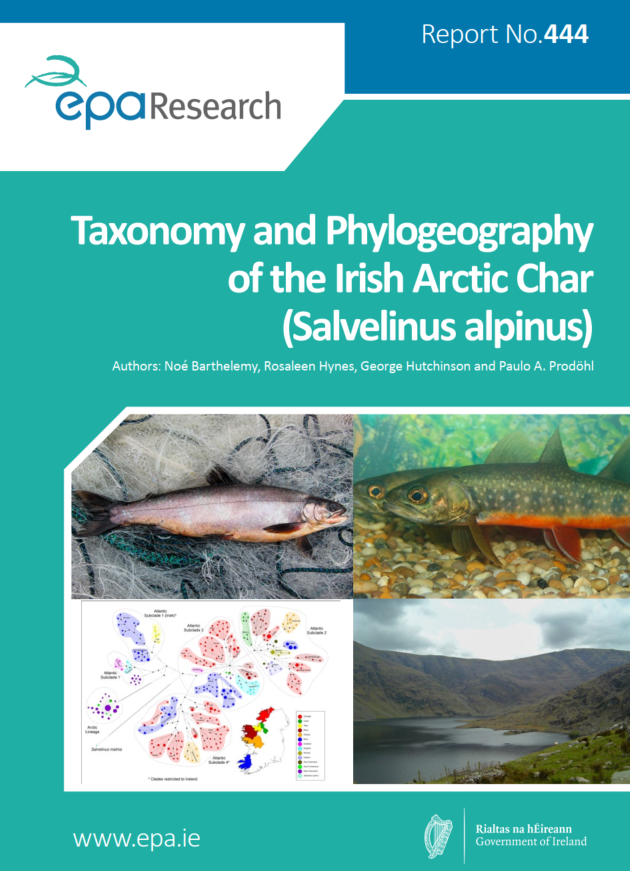
Authors: Noé Barthelemy, Rosaleen Hynes, George Hutchinson and Paulo A. Prodöhl, December 2023
Year: 2023
Salmonid Arctic char is a freshwater fish species vulnerable to low oxygen levels, rising temperatures associated with global warming, threats from invasive species, and water abstraction activities. There is an urgent need for effective conservation and management of Irish Arctic char, as it is recognised as “vulnerable” in the Irish Red Data Book. The study examined the role of scientific communication in influencing policymakers' decisions on conservation of this species.
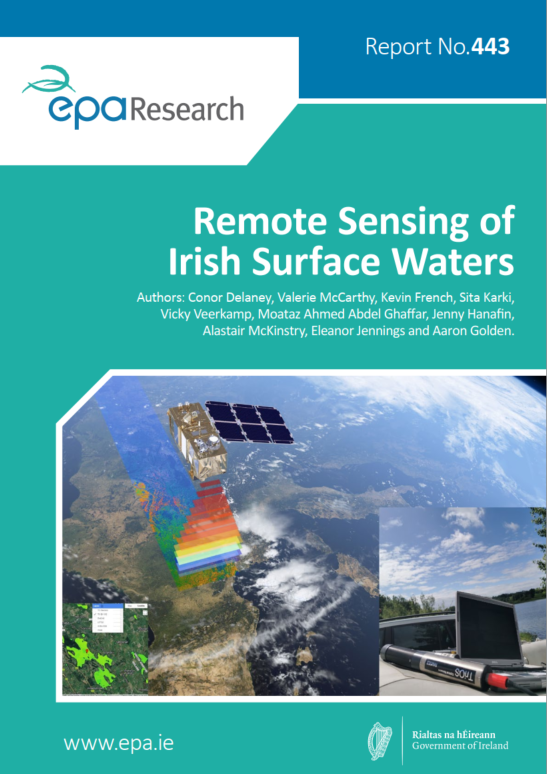
Authors: Conor Delaney, Valerie McCarthy, Kevin French, Sita Karki, Vicky Veerkamp, Moataz Ahmed Abdel Ghaffar, Jenny Hanafin, Alastair McKinstry, Eleanor Jennings and Aaron Golden, November 2023
Year: 2023
Lakes, estuaries, and coastal waters are crucial for human well-being. Lakes are critical sources of drinking water, and support irrigation, fisheries, and aquaculture activities. These waters are also important for recreation and tourism and support high levels of biodiversity. The number and diversity of water bodies in Ireland makes regular in situ monitoring an acute challenge for regulatory authorities. Ireland has legally binding legislative obligations under the WFD. This project determined if the use of freely available Earth observation data from both the Copernicus and Landsat Earth observation programmes could offer a cost-effective and evidence-based means of remotely monitoring such water bodies in Ireland.
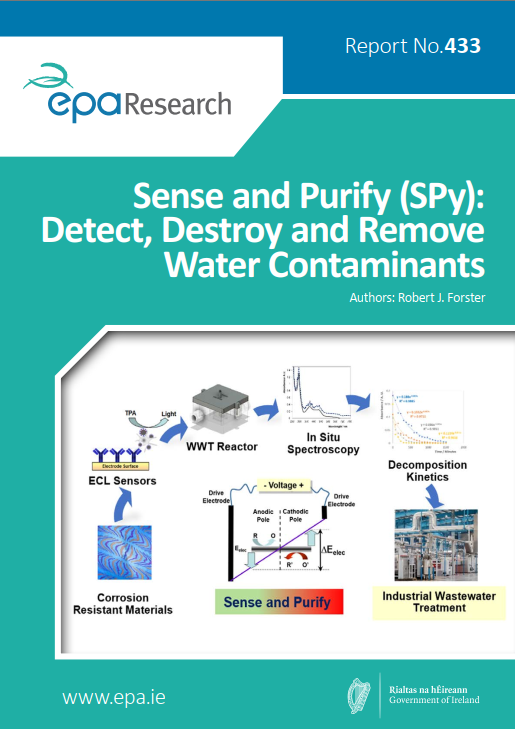
Authors: Robert J. Forster, June 2023
Year: 2023
Many wastewater streams, such as those from the pharmaceutical and food industries or from municipal wastewater, for example, contain pollutants. The SPy project developed the eco-innovative ‘Sense and Purify’ (SPy) technology, which has significant advantages over traditional treatment processes, including low operations costs, significantly lower energy consumption, higher conversion efficiency, better effluent water quality and lower waste production.
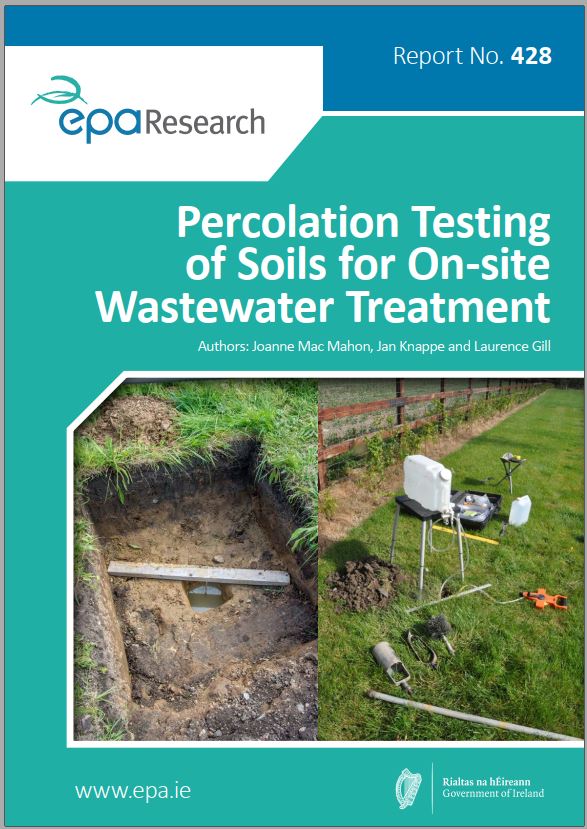
Authors: Joanne Mac Mahon, Jan Knappe and Laurence Gill, January 2023
Year: 2023
Estimation of soil permeability is a critical aspect of on-site wastewater treatment system design. The findings of this research identify a need to revise the currently available options in the Irish Code of Practice for estimating soil permeability for on-site wastewater system design. In this research, a correlation was developed between field saturated hydraulic conductivity (Kfs) and percolation time (T-values) across a full range of Irish soil texture data.
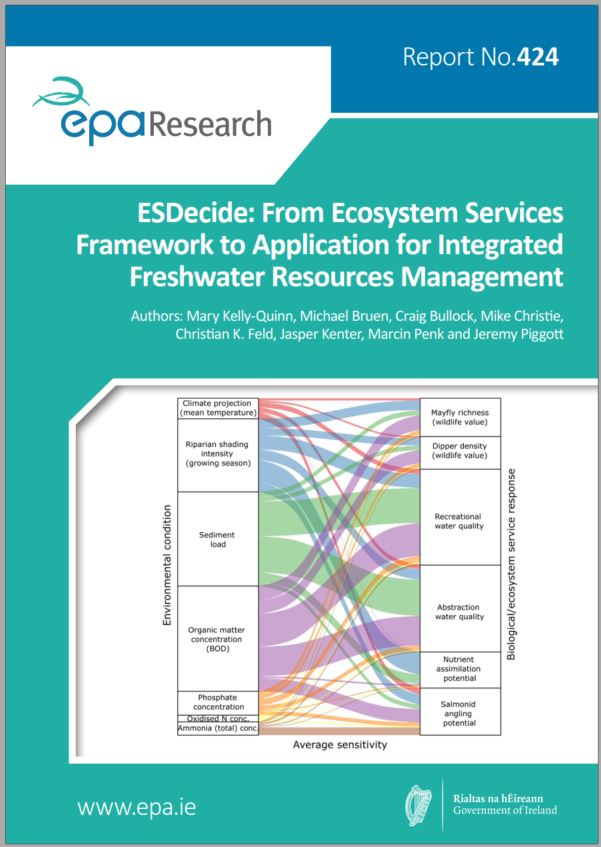
Authors: Mary Kelly-Quinn, Michael Bruen, Craig Bullock, Mike Christie, Christian K. Feld, Jasper Kenter, Marcin Penk and Jeremy Piggott, September 2022
Year: 2022
The ESDecide project set out to build on the outputs of the previous EPA-funded ESManage project by developing the tools and guidance needed to advance the incorporation of ecosystem services and the concept of “nature’s contribution to people” (NCP) into decision-making for the protection and management of freshwater resources and other related policy goals. The project developed the interactive decision support tool ProgRES, which helps river resource managers estimate the probability of changes in biological responses and the associated ecosystem services/NCP changes in environmental conditions.
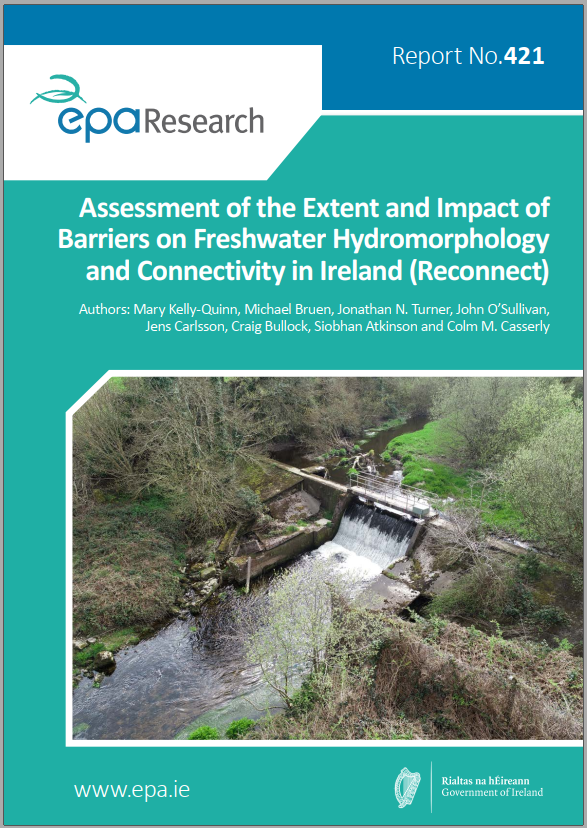
Authors: Mary Kelly-Quinn, Michael Bruen, Jonathan N. Turner, John O’Sullivan, Jens Carlsson, Craig Bullock, Siobhan Atkinson and Colm M. Casserly, September 2022
Year: 2022
The Reconnect project advanced knowledge on the impact of low-head barriers on connectivity in Irish rivers in terms of sediment dynamics and ecology (fish, macroinvertebrates and macrophytes) through studies undertaken from 2016 to 2020 in four core study areas on the Duag, Dalligan and Burren rivers and Browns Beck Brook and at 35 other locations across 12 river/stream systems. The project also developed a methodology for prioritising barriers for modification or removal to improve hydromorphology and connectivity.
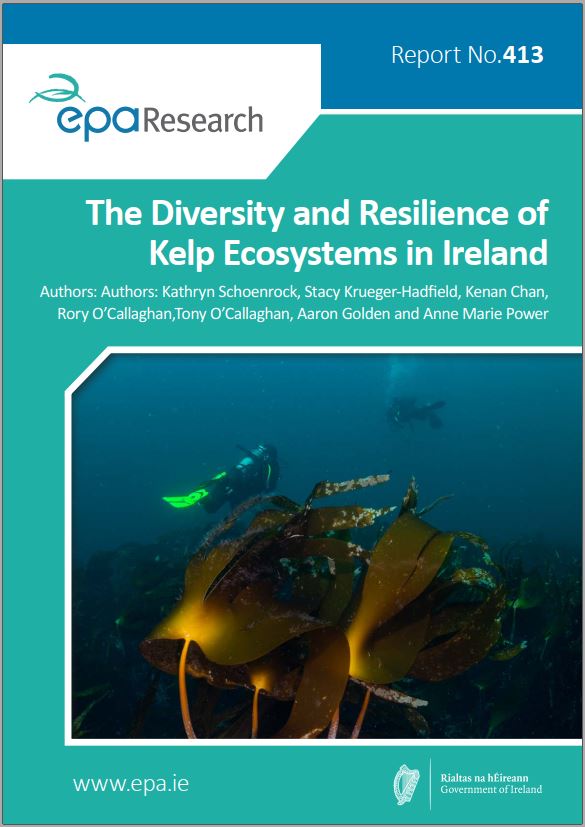
Authors: Kathryn Schoenrock, Stacy Krueger-Hadfield, Kenan Chan, Rory O’Callaghan, Tony O’Callaghan, Aaron Golden and Anne Marie Power, July 2022
Year: 2022
In Ireland, Kelp forests can be found along rocky shorelines and dominates rocky substrata along the Irish coastline (approximately 3010 km out of the 7524 km of national shoreline). The report makes recommendations concerning monitoring and preserving kelp ecosystems nationwide. A range of resilience metrics was assessed for subtidal kelp forests in Ireland to better understand how to monitor, manage and simply understand these systems and their potential responses to climate shifts in nearshore ecosystems.
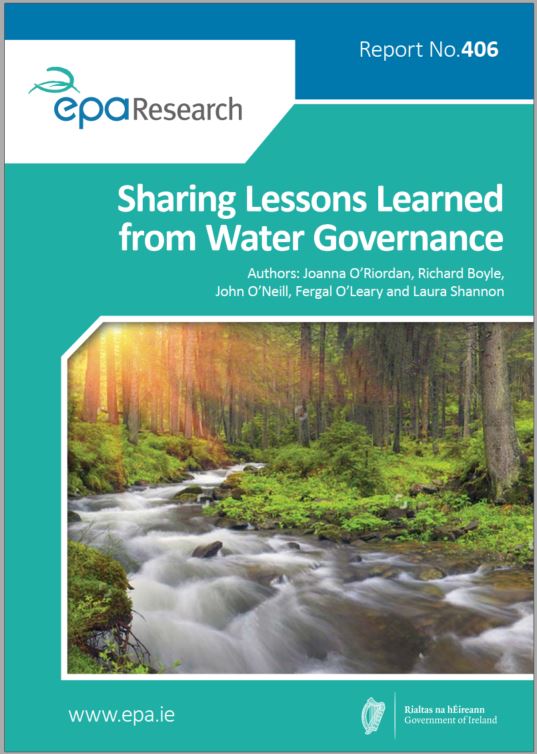
Authors: Joanna O’Riordan, Richard Boyle, John O’Neill, Fergal O’Leary and Laura Shannon, March 2022
Year: 2022
Clean, healthy water is essential for our economy, our aquatic wildlife and our health and wellbeing. However, as noted in the draft third-cycle River Basin Management Plan (Department of Housing, Local Government and Heritage, 2021), there are mounting environmental pressures on Ireland’s waters with the situation described as ‘’urgent’’. The objective of this research was to review changes in structures and processes made under the second-cycle River Basin Management Plan, 2018–2021, to inform thinking regarding the third-cycle River Basin Management Plan, 2022–2027.
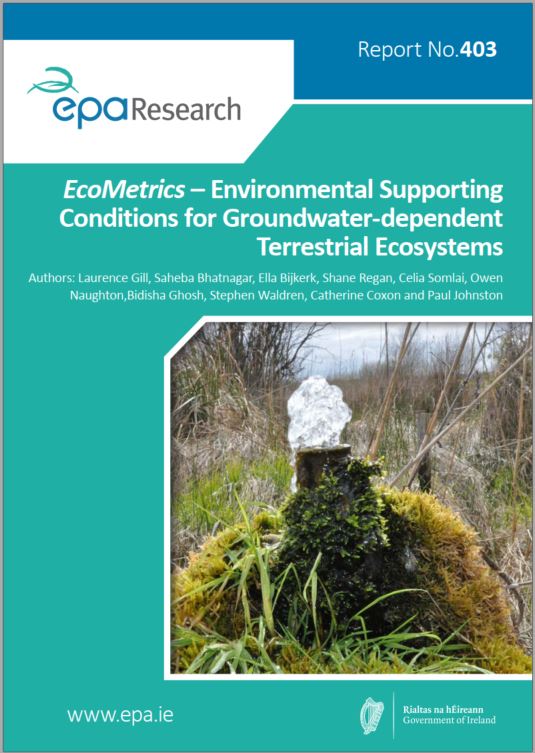
Authors: Laurence Gill, Saheba Bhatnagar, Ella Bijkerk, Shane Regan, Celia Somlai, Owen Naughton, Bidisha Ghosh, Stephen Waldren, Catherine Coxon and Paul Johnston, February 2022
Year: 2022
Wetlands provide important regulating ecosystem services, such as water purification, carbon capture and storage, and flood protection. They also provide rich habitats for biodiversity, including many protected species. This research project evaluated and developed methods for the assessment and definition of appropriate ecohydrological metrics to help policymakers conserve and/or restore wetlands, particularly with respect to meeting the objectives of the Water Framework Directive and Habitats Directive as applied to GWDTEs in Ireland.
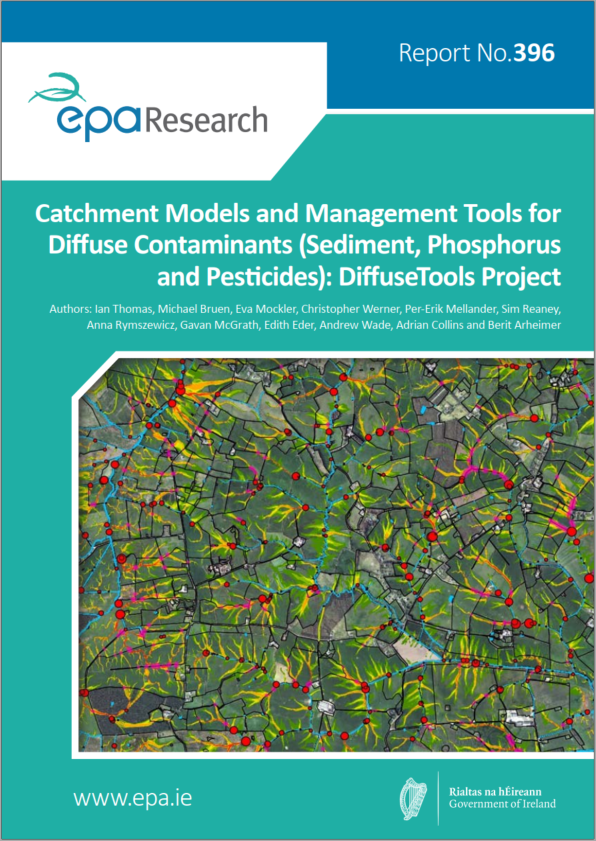
Authors: Ian Thomas, Michael Bruen, Eva Mockler, Christopher Werner, Per-Erik Mellander, Sim Reaney, Anna Rymszewicz, Gavan McGrath, Edith Eder, Andrew Wade, Adrian Collins and Berit Arheimer, November 2021
Year: 2021
Eutrophication, often driven by phosphorus, is the most significant issue for inland surface waters in Ireland. Half of Irish river water bodies still require improvements to bring them to good status, as required by the Water Framework Directive (WFD) (2000/60/EC). This research contributes to Ireland’s response to the third River Basin Management Plan of the WFD and to the development and implementation of more sustainable and cost-effective agricultural policies.
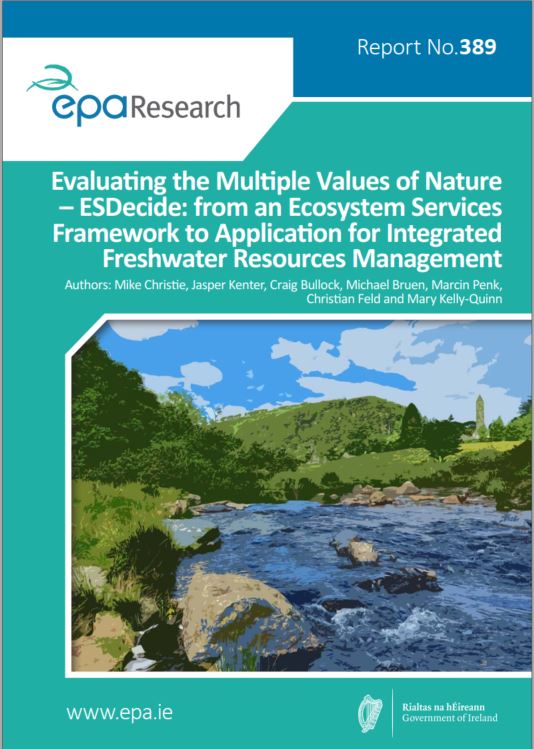
Authors: Mike Christie, Jasper Kenter, Craig Bullock, Michael Bruen, Marcin Penk, Christian Feld and Mary Kelly-Quinn, August 2021
Year: 2021
The Water Framework Directive requires the EPA to monitor the quality of water in Ireland’s rivers and lakes. This research reviewed the multiple values and benefits of nature, often termed ‘ecosystem services’ or’ nature’s contributions to people (NCPs)’. It provides insights into the multiple ways people value rivers and associated ecosystem services/ NCPs. The research also developed a decision support tool to assess the impacts on ecosystem services/NCPs of alternative river catchment measures.
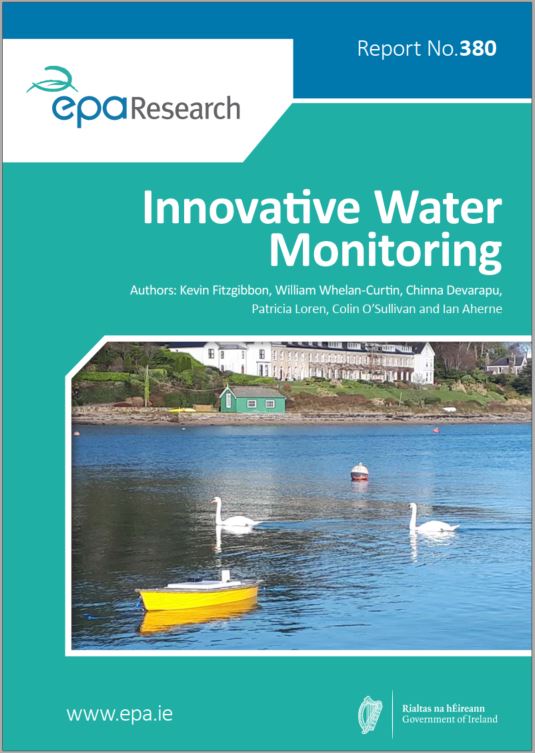
Authors: Kevin Fitzgibbon, William Whelan-Curtin, Chinna Devarapu, Patricia Loren, Colin O’Sullivan and Ian Aherne, June 2021
Year: 2021
The Innovative Water Monitoring project aimed to create an additional innovative sensing system for real-time detection of water quality parameters, to support the existing water quality monitoring policies, programmes and requirements under the Water Framework Directive, the Bathing Water Quality legislation, etc. It has demonstrated the ability to detect two such parameters, nitrates and Escherichia coli (E. coli), using the system.
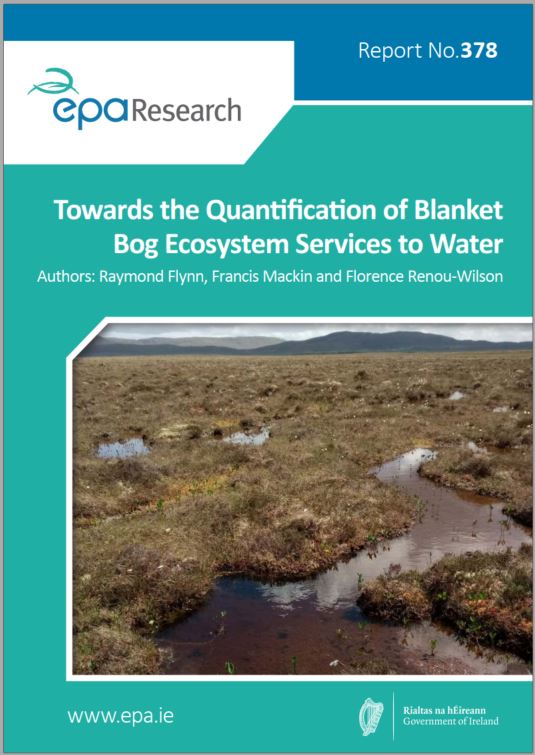
Authors: Raymond Flynn, Francis Mackin and Florence Renou-Wilson, June 2021
Year: 2021
Blanket bogs are common in many areas of Ireland, contributing to our most iconic landscapes. However, although they cover approximately 13% of the country, natural processes sustaining blanket bogs remain poorly understood. This research aimed to better understand blanket bog hydrology through a 3-year programme in which researchers monitored the flow and water quality in streams draining Irish blanket bogs that are relatively intact.
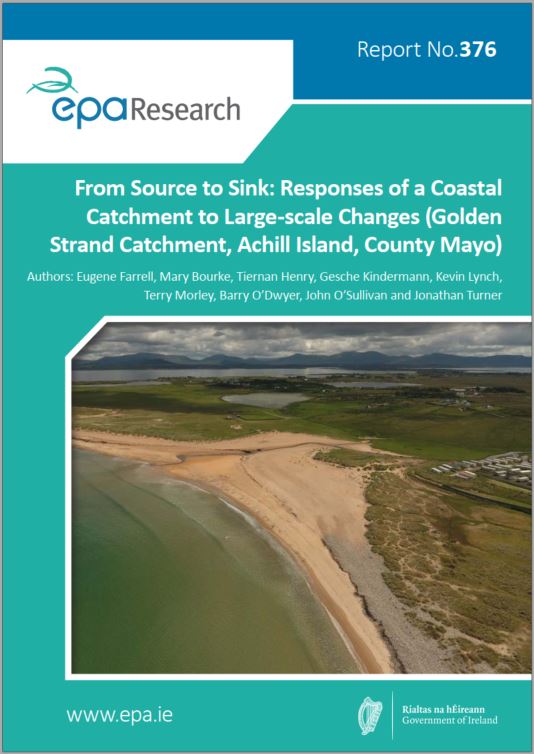
Authors: Eugene Farrell, Mary Bourke, Tiernan Henry, Gesche Kindermann, Kevin Lynch, Terry Morley, Barry O’Dwyer, John O’Sullivan and Jonathan Turner, June 2021
Year: 2021
This research is a series of field experiments that measured patterns in the sediment and water pathways in the Golden Strand catchment, Achill Island, County Mayo. The results show that climate changes (storminess, temperature, precipitation) impacts are site specific and require long-term, multi-disciplinary field monitoring programmes (geomorphology; ecology; hydrology) to capture local specificity and environmental variability.
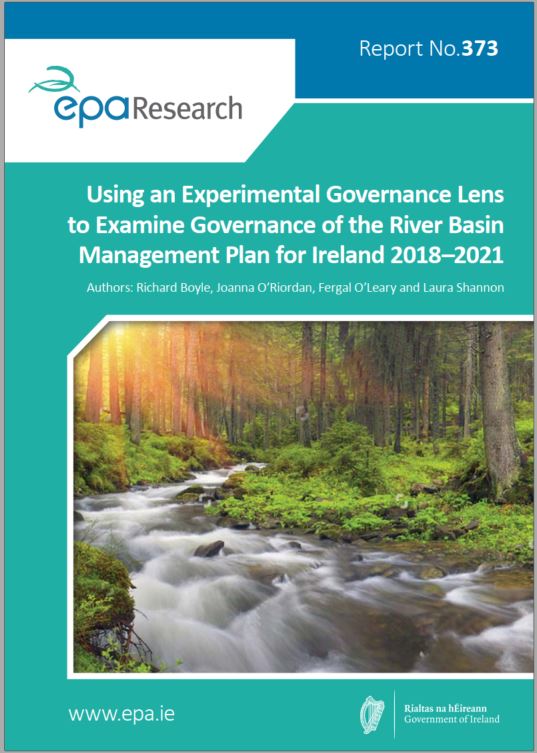
Authors: Richard Boyle, Joanna O’Riordan, Fergal O’Leary and Laura Shannon, May 2021
Year: 2021
This report examines lessons learned from the water governance arrangements put in place for the River Basin Management Plan (RBMP) 2018–2021 for Ireland through the lens of experimental governance. The study finds that the three-tier governance structure is appropriate and should be continued. However, there is still room for improvement in the area of adapting and improving the operation of the existing arrangements.
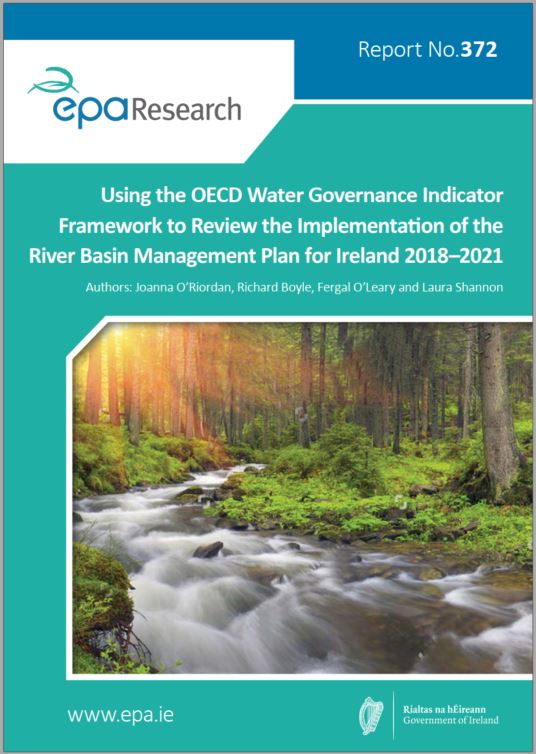
Authors: Joanna O’Riordan, Richard Boyle, Fergal O’Leary and Laura Shannon, May 2021
Year: 2021
This report assesses water governance in Ireland using the Water Governance Indicator Framework, a tool developed by the Organisation for Economic Cooperation and Development (OECD) in 2018 to assist countries in assessing their progress towards the European Union’s Water Framework Directive.